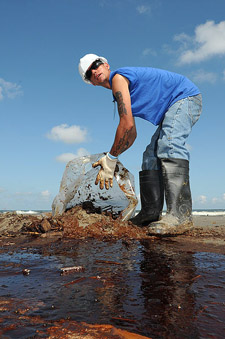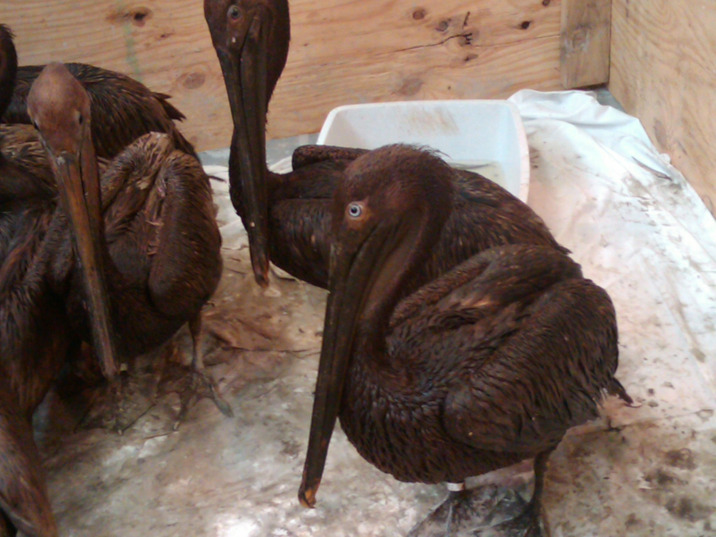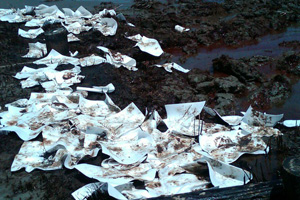
You know the story: Boy calls girl, girl goes to pick up boy, boy and girl go sit on a beautiful beachside deck to enjoy the night breeze and listen to the waves crash as he tells her a bunch of terrible things that are going on at an oil-spill cleanup site. Yes, I had a date with Elmer, my mole inside BP’s cleanup operation, and he painted a grim picture of the conditions for both workers and wildlife at Louisiana’s Elmer’s Island Wildlife Refuge.
First, the workers: The men on Elmer’s Island don’t wear respirators since BP and OSHA have thrown precaution to the wind and deemed them unnecessary. But the only type of air-monitoring equipment Elmer’s ever seen on the island are little multigas meters that are not up to the job: They’re designed for indoor use, clog easily, and only measure limited types of pollutants. And despite the known dangers of dispersants and the toxic chemicals in crude (I can attest that contact with the stuff washing up on the beach can burn), workers aren’t even wearing protective Tyvek suits anymore. Of course, there are medics on hand to treat anyone who gets hurt or sick. Unfortunately, any worker who asks for a medic’s help is automatically drug tested, which, for some, can be a powerful incentive to not report injuries. (Not that keeping a cleanup job necessarily equals getting paid: Elmer says the contractors continue to lose workers’ paychecks, a problem he told me about the last time we talked and that has since been confirmed by the local papers.)
 Cleanup workers on these South Louisiana beaches aren’t the only ones who could use more protections. What Elmer told me echoed the reports that BP isn’t exactly doing everything in its power to keep track of the toll the spill is taking on wildlife. In nearby Port Fourchon, where he has also worked, there are markers to denote wildlife nesting areas, but they aren’t clearly labeled and no one knows what they mean, so workers drive and trample over sensitive habitats. One day last week, Elmer and his coworkers came upon eight oiled pelicans, but though they called the official number to report their findings, no one had come to collect the birds by the time his shift ended many hours later. (A representative from the Louisiana Department of Wildlife and Fisheries has yet to respond to my request for comment.) Workers on Elmer’s have not been instructed to report dead animals for collection or autopsy. Elmer said he’d recently come upon a dead crab and, knowing no one was going to come to examine it, decided to slice it open himself. Black oil poured out.
Cleanup workers on these South Louisiana beaches aren’t the only ones who could use more protections. What Elmer told me echoed the reports that BP isn’t exactly doing everything in its power to keep track of the toll the spill is taking on wildlife. In nearby Port Fourchon, where he has also worked, there are markers to denote wildlife nesting areas, but they aren’t clearly labeled and no one knows what they mean, so workers drive and trample over sensitive habitats. One day last week, Elmer and his coworkers came upon eight oiled pelicans, but though they called the official number to report their findings, no one had come to collect the birds by the time his shift ended many hours later. (A representative from the Louisiana Department of Wildlife and Fisheries has yet to respond to my request for comment.) Workers on Elmer’s have not been instructed to report dead animals for collection or autopsy. Elmer said he’d recently come upon a dead crab and, knowing no one was going to come to examine it, decided to slice it open himself. Black oil poured out.
I’ve seen some pathetic excuses for cleanup out here—were the workers on Elmer’s at least making some progress? “They’re not being effective out here,” Elmer said. “Two days after your article, they bused in twice as many workers, so they’re up to 120 guys on Elmer’s now, but I can’t see any considerable difference. They’re only working five sites and it’s eight miles of beach. No one seems concerned about cleaning it up. The contractors are getting their money; they don’t care. They’ve got all these people out there, but they’re not accomplishing anything.”
Oh, wait. Not nothing: “They’ve brought in prostitutes.” No one knows who the “they” that brought in the pack of hookers is, but the gals have definitely arrived, and you can buy time with one for $200. It only took someone a whole month even to figure out that it would be lucrative to sell sex to guys earning 44 hours of overtime a week and living in camps and converted 18-wheelers.
Photograph of Elmer’s Island Wildlife Refuge cleanup by US Coast Guard















